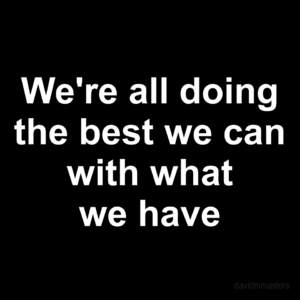When you let someone hurt you, it’s easy to jump to the conclusion that someone has struck out at you, even assaulted you. When your feelings are hurt because of what someone else said or did, it might be more difficult to realize that the responsibility for how you feel is on you, not the other person.
You make the choice to allow someone else’s words of deeds offend, hurt your feelings, or affect you in a negative way because you could also choose to not let whatever anyone else says of does to affect you.
While enduring all kinds of torture and suffering, Viktor E. Frankl, said, “The one thing you can’t take away from me is the way I choose to respond to what you do to me. The last of one’s freedoms is to choose one’s attitude in any given circumstance.”
While being beaten for practicing civil disobedience, Mahatma Gandhi said, “Nobody can hurt me without my permission.”
These are both excellent examples of men who chose to rise above their current situation to disallow anyone else to exercise dominion over their state of mind. You too, can have this unshakeable resolve, if you so choose.
We go through life with the default setting of allowing other people to hurt us deeply and even feel the pain in our bodies as if we’d been beaten, assaulted, or tortured, when we have not actually been touched, and this is our choice.
We choose to feel sick to our stomachs, suffer sleepless nights, low energy levels, depression, and little motivation even to eat or get out of bed because of what someone else treated us. This is a lot of power over us to be granted to another person.
As perverse as this might be, it’s an attitude which you have been programmed to hold tight to as a method to control you within the prison of your own mind. Many heroic individuals have discovered this and broken through the programming to find their own peace in any circumstance.
You can choose to have the power to not let anyone shake your state.
Once you discover that you have the choice to be unmoved by anyone or anything outside yourself, you also realize that when you let someone hurt you, have made the choice to allow someone to affect you deeply out of respect or love, if you so desire.
From this vantage point you have the knowingness and power of your control over your state of mind at any time regardless of what other people think, say, or do. You are the master of your emotional state.
This high level of emotional maturity is within the grasp of anyone with the courage to grasp the idea and wrap their heart around such a concept.
There’s no need to look back at all the wasted hours, days, and living of life by being overly concerned about the dominion you allowed others to have over you. What is important is that from here on out, you are the master of your emotional state.
Nothing can hurt you.
Disappointment, fear, offensive statements, abusive circumstances (even the most unimaginable) are no longer effective weapons against you.
Also, letting go of expectations can be an effective tool in allowing others to have control over you, for if you let go of the emotional attachment to the expectation of a particular response or outcome, your emotional state is not at risk and cannot be shaken.
You decide to live your life in a state of pain and suffering or love and joy.
When you let someone hurt you, it is not without your invitation or permission.


